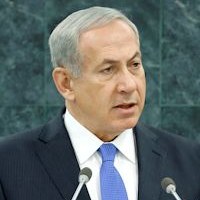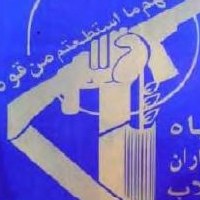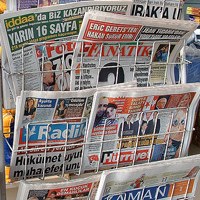June 04-08, 2010 | Lose-lose for Turkey and Israel [also published in the Jerusalem Post], Who’s Afraid of Turkey [also published in Newsweek] and Turkey’s Clash of Civilizations [also published in the Wall Street Journal] | By Soner Cagaptay
Under the Islamist Erdogan government, Turkey can no longer be considered an ally of Israel or the West.
Lose-lose for Turkey and Israel
Turkish-Israeli ties, born in March 28, 1949 when Turkey became the first Muslim-majority country to recognize Israel, effectively ended on May 31, 2010. This happened as IDF commandos boarded a convoy of ships reportedly bringing humanitarian assistance to Hamas-run Gaza.
Previously, Israeli officials had pleaded with the Turkish officials not to allow the convoy to set sail from Istanbul, suggesting that it would be intercepted if it entered Israeli waters. Turkey’s Justice and Development Party (AKP) government nevertheless let the mission sail. In the ensuing scrimmage in the Mediterranean, the commandos boarding the ship were faced with stiff resistance from members of the convoy. Bloodshed followed; troops killed a number of people, and wounded more, including at least 14 Turkish citizens.
This episode means that bilateral ties between Turkey and Israel are effectively over, at least for the foreseeable future. Not only have the two countries lost each other, but they have also lost a bit of themselves.
Israel has lost its second most important ally, a rare friend in a hostile region, and with this a major part of its security. Since the 1950s when Turkey and Israel established a secret treaty known as the Peripheral Pact, Israel has trusted Turkey as the only genuine regional ally, rain or shine. For instance, the treaty stipulated that, if attacked, Israel could park its navy in Turkish waters. Effective May 31, 2010, Israel cannot trust the AKP government to defend it.
Turkey has lost what makes it special: its ability to be Muslim and Western at the same time, a uniquely Turkish characteristic. They had it coming ever since the AKP took power in 2002.
Turkish-Israeli ties have been on a downhill trajectory, which began with the AKP’s sharp criticism of Israeli policies following Operation Cast Lead. While some dismissed this rhetoric as domestic politicking, it was the ideological periscope of the AKP’s subsurface foreign policy. The AKP did not have any intention of aligning with Israel. Rather, it went along with Israel until the opportunity presented itself to call off the relationship.
Its rhetoric served as the litmus test of what lay ahead.
The Israelis, having few real friends in the region and therefore not knowing what to do with harsh rhetoric coming from this rare ally, first denied the problem and then overreacted.
In the incident known as the “low chair affair,” Israeli Foreign Ministry officials decided to humiliate the Turkish ambassador by seating him on a low chair in a televised meeting. In the ensuing scandal, the entire Turkish nation felt insulted, rallying behind the AKP’s negative criticisms and stance toward Israel.
This is also what happened on May 31. Turkey is a proud nation; perhaps this is its hallmark. It would have been enough for it to turn against Israel had the Israelis bloodied the nose of one Turk. Hence, after news of bloodshed surfaced, tens of thousands of protesters gathered across Turkish cities, chanting “Down with the Zionist state,” and “We are all Hamas.”
Surprisingly, T-shirts and headbands with these slogans were readily available, perhaps signaling that for some, the crisis was anticipated. The AKP government then recalled its ambassador and canceled three bilateral military exercises. AKP officials have called Israel a “pirate state,” and a “terrorist state,” and right-wing pundits have followed, illuminating a Nasserite trend – Israel is fast becoming the country-whose-name-shall-not-be-uttered in Turkish politics. The AKP also added that Turkish-Israeli relations would not be revived unless Israel recognizes Hamas and lifts the blockade on Gaza. This provides another avenue for the AKP to say that Turkish-Israeli ties are dead
For Israel, this means that Turkey has switched camps. From now on, barring a change of government in Ankara or a change in Israel’s policy toward Hamas, Turkey is on the other side of the Middle East debate regarding Israel. What is more, Turkey cannot be expected to act as a mediator between Israel and its neighbors, a role some had suggested Ankara could play under the AKP.
The trick for Israel is to make new calculations to win back Turkey’s support. Israel now sorely lacks the region’s strongest power that has watched its back for decades, and there is no replacement in sight.
For Turkey, the challenge is to remain true to itself. Ever since 2001, Turkey’s Muslim identity has come to the fore as a precious feature praised in Washington, Brussels and Tel Aviv. Being Muslim does not make Turkey unique though; there are, after all, 57 other Muslim-majority countries.
Rather, what made Turkey special was the country’s unique Western overlay in domestic and foreign policy, specifically its secular democratic political culture, NATO membership and good ties with Israel.
If Turkey is to continue to be unique, this view has to drive its policy.
For now, the effective end of Turkish-Israeli ties is more than just an issue of bilateral relations between these two important states. This is also the end of at least a bit of Turkey as we have come to know it.
May Turkish-Israeli ties rest in peace.
Who’s Afraid of Turkey?
Turkey is starting to scare Americans, for good reason. There was the high-profile clash at Davos over the Palestinians, fraying Turkish ties to Israel. Then came the surprise uranium deal with Tehran, undermining Western pressure on Iran to come clean about its nuclear program. Now there’s a new clash with Israel over Turkish support for the convoys challenging Israel’s embargo on Gaza. But just as Turkey is starting to look more assertively pro-Islamist than ever, there are signs that a big internal shift may reshape Turkish politics and redirect its foreign policy back toward the West.
This would end a drift that began in 2002, when the Justice and Development Party (AKP), rooted in the country’s Islamist movement, came to power. It has grown more authoritarian, and anti-Western, ever since. The NGO that sponsored the Gaza flotilla has close ties to the AKP, has sponsored numerous fundraisers in the Istanbul convention center controlled by the AKP city government, and has been designated by the U.S. as part of an umbrella group of terrorist organizations. Now AKP leaders are pressing the U.S. for a more aggressive response.
But for the first time in years, the AKP faces a real challenge. Turkey’s main opposition, the Republican People’s Party (CHP), lately has been a mere shadow of the secular force that once ruled the country and made it a staunch NATO ally. Now the resignation of CHP leader Deniz Baykal over an alleged sex-tape scandal has ushered in a new boss, Kemal Kilicdaroglu, a charismatic people’s man who is committed to Western values. He might be the one to rebuild an effective opposition and redirect Turkish foreign policy toward the West.
Kilicdaroglu has already voiced support for Turkey’s effort to join the European Union, which has stalled in part due to European resistance to admitting a Muslim member, but also due to the AKP’s withering interest in the process since Ankara started membership talks in 2005. Kilicdaroglu has backed some of the government response to the latest Gaza incident—it would be impossible for any Turkish politician not to, given that Turkish activists were killed—but he could still bring change in the future.
Kilicdaroglu will have to recalibrate his party’s commitment to the ideals of Kemal Atatürk, who founded modern Turkey as a secular state. This New Kemalism would recall Atatürk’s 20th-century desire for Turkey to become European, making EU membership and realigning with the West top priorities while downplaying the AKP’s rapprochement with Iran and Russia. There are signs that this is happening already, including Kilicdaroglu’s encouragement of prominent pro-EU Turkish diplomats to join the CHP. New Kemalism would abandon the AKP’s ideological sympathy with Iran in favor of a pragmatic nationalist view: a nuclear Iran is against Turkish interests.
Kilicdaroglu, nicknamed “Gandhi Kemal” for his humility, to which the Turks have taken a liking, is already changing the CHP, taking the party, the heir to a social-democratic politics, back to the working and middle classes. He is also beginning to make New Kemalism more attractive at home by keeping its liberal aspects while coming to terms with religious issues: the new party assembly includes both a record number of women and an imam.
The CHP needs to challenge the AKP’s success at creating what Turks see as a forward-looking vision—one that respects the nation’s conservative social values and carves out a position of respect for Turkey within the transatlantic community. In recent years the CHP has defined itself mainly by saying no to the AKP, so the change in leadership presents an unprecedented opportunity—Turkish leaders do not usually quit politics until they die—to introduce New Kemalism. Can Kilicdaroglu win? For now the Gaza debacle is boosting the AKP’s popularity, but the CHP has a solid base. Opinion polls suggest that 32 to 38 percent of Turks would never support the AKP. Kilicdaroglu’s politics can expand this base. The AKP has won repeated elections since 2002 with strong support among lower-middle-class voters, Turkey’s demographic plurality, thanks to its rhetoric of social justice laced with conservative overtones. Kilicdaroglu’s pro-working-class message will help him win over these voters. If Kilicdaroglu can advance New Kemalism as a pro-Western, social-democratic movement at peace with both secularism and religion, Atatürk’s party might once again return to power in Turkey. It can’t happen soon enough to change the dynamics of the Gaza crisis, but it can happen.
Turkey’s Clash of Civilizations
Ever since the Islamist Justice and Development Party (AKP) assumed power in 2002, Turkish foreign policy has made a 180-degree turn. The country’s once-strong ties with the United States and Israel have been weakened, and entry talks with the European Union have stalled while Ankara has come to the defense of the Iranian nuclear program and Hamas. The reason for this shift is simple: Prime Minister Recep Tayyip Erdoğan and his government believe that Samuel Huntington was right, that there is a clash of civilizations. Only they are on the side of the Islamists, not the West.
For the AKP, “Turkey’s traditionally strong ties with the West represent a process of alienation.” This is a quote from “Strategic Depth,” the opus written by Ahmet Davutoğlu, Turkey’s foreign minister. Unfortunately, “Strategic Depth” has not been translated into English, though Westerner would do well to read it to get a better understanding of Ankara’s thinking. The work’s executive summary answers all questions about the AKP’s foreign policy:
“Since the end of the Ottoman Empire, Muslims have gotten the short end of the stick, and the AKP is here to correct all that.”
The AKP won’t correct all wrongs against Muslims, though. This is because Islamism—a political ideology that sees Muslims in perpetual conflict with the West and with “non-believers“–and not Islam, guides the AKP’s foreign policy. Ankara will therefore favor other Islamists over Muslims that don’t share their Manichean worldview. Thus, the party will forgive and even defend the ills of Islamist regimes against fellow-Muslims, such as the Sudanese genocide of Darfuris or Tehran’s suppression of its own population. Likewise, it will support Islamist Hamas and its violent goals, but not the secular Palestinian Authority or the peaceful Palestinian cause.
This selective solidarity also applies to ills committed against Muslims by non-Muslims, as long as those non-Muslims are anti-American or anti-European. That’s because political Islam has made the strategic decision that the enemy of its enemy is its friend . Hence, Russia will get a pass regardless of how many Chechens it kills.
Ankara, though, will always singularly target Israel, because the AKP adheres to the Islamist view that the Jewish state as such—irrespective of its specific borders or policies—will always be a sore in the “Muslim world.”
There is little the West can do to change the AKP’s foreign policy outlook. In fact, some policymakers and pundits in Washington and European capitals have, perhaps unwittingly, helped empower this development in the first place. Believing that the supposedly reformed Islamist AKP could be a bridge-builder between Western and Muslim countries, they promoted the new Turkish government as a special mediator in the region while shielding it from those critics who worried early on about the AKP’s worldview.
Allowing such an Islamist catalyst into the Middle East’s conflicts produced devastating results. Because the AKP sees a clash of civilizations everywhere it looks, it cannot be an impartial mediator. Hence, when the AKP was allowed to interject itself between Hamas and the Palestinian Authority, or the United States and Iran, it quickly became a tribune for the Islamist side, rising in their defense. After eight years of increasingly authoritarian and dominant AKP rule at home, many Turks now also see the world through the Islamists’ eyes of a civilizational clash.
Even though the AKP is the main political force in the country, the party’s popularity has been sliding after the opposition Republican Peoples’ Party elected a new charismatic leader. One survey even showed the opposition party pulling ahead of the AKP for the first time since 2002. Recent polls, however, show that the Gaza debacle that resulted in the tragic death of Turkish citizens has boosted the AKP’s popularity.The government will no doubt continue to use populist, anti-Western foreign policy to boost its popularity in the run up to next year’s elections.
The West needs to face the reality that, despite the country’s NATO membership, Turkey can no longer be considered a Western ally under the AKP. In order to contain the AKP’s Islamists influence not just in Turkey but also in the region, the West must deny the Erdogan government the influence and prestige that comes with being promoted as a regional mediator. It’s time for Western leaders to distance themselves somewhat from Ankara.



 RSS
RSS











Erdogan’s Turkey, Islamism and the Ottoman Empire #israel #turkey #islamism http://j.mp/dluRC4
Erdogan’s Turkey, Islamism and the Ottoman Empire http://bit.ly/9MDpP9 (via https://www.crethiplethi.com/)
RT @CrethiPlethi: Erdogan’s Turkey, Islamism and the Ottoman Empire #israel #turkey #islamism http://j.mp/dluRC4
[…] Erdogan's Turkey, Islamism and the Ottoman Empire | Middle East … […]
[…] This post was mentioned on Twitter by Elisabeth and Supporting My Pres., Crethi Plethi. Crethi Plethi said: Erdogan’s Turkey, Islamism and the Ottoman Empire #israel #turkey #islamism http://j.mp/dluRC4 […]
10 Mexican police killed in ambush…
(CNN) — Ten Mexican federal police were killed and several others wounded in an ambush on a convoy Monday, the government said. An undisclosed number of criminals also were killed and wounded, the government’s Information Ministry said in a release. …
[…] Erdogan's Turkey, Islamism and the Ottoman Empire | Middle East … […]
LimBamian Politics 101: 2010 The Limbaugh-Obama Mentality Takes Hold…
I found your entry interesting do I’ve added a Trackback to it on my weblog :)…
See the oustanding documentation AGHET made by Eric Friedler about the truth of the Armenian Genocide, with many proofs, long time hidden in order not to harm Turkey. The documentation was shown twice on two notable German TV stations in April this year and will be shown again in September. This is a very great sign as it’s a German production although it depicts the complicity of Germany (= Turkey’s Ally) in the Armenian Genocide.
PLEASE TAKE SOME TIME, WATCH IT AND SPREAD THE LINK.
––––––––––––––––––––––––––––––––––––––––––––––––––
http://www.youtube.com/view_play_list?p=B4306054D5680A18
––––––––––––––––––––––––––––––––––––––––––––––––––
THANK YOU.